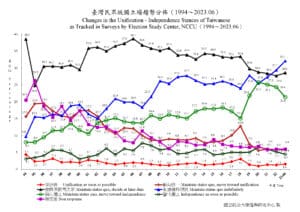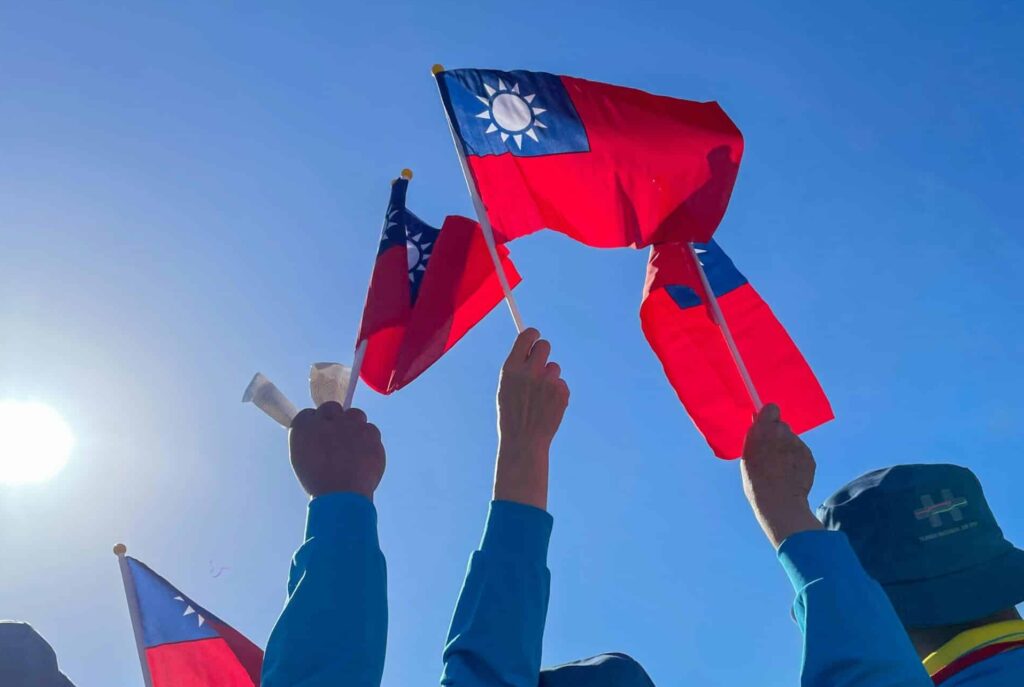On 13 January, the eyes of the world were on Taiwan. Lai Ching-te, since 2023 leader of the Democratic Progressive Party (DPP), won the election with a clear lead. The DPP is now delivering the president for the third time in a row. It is the first time in Taiwan's history that a party has managed to do so.
In Lai's campaign, he promised to become a "Tsai 2.0": international policy, cross-strait and US relations would remain the same as under current Taiwanese president Tsai Ing-wen In other words, the status quo would be preserved. As shown in the chart below, in recent years Taiwanese people are leaning more towards keeping the status quo, rather than either independence or unification.

The campaign's focus was also more on addressing social problems than in previous elections. However, some critics say the outcome of this election is not so much due to Lai and the DPP, but to the Kuomintang (KMT) and Taiwan's People's Party (TPP). These two parties failed to win a joint ticket form, making it a three-way battle. This probably contributed to Lai's win. The KMT, or Nationalist Party, once ruled China and has a substantial pro-unification constituency. The TPP mainly presents itself as an alternative third party to the DPP and KMT, which have long dominated Taiwanese politics.
Dr Dafydd Fell, Taiwan expert (SOAS, University of London), highlighted How unpredictable this election was. Taiwan has a ban on polls for 10 days before election day. This not only increases uncertainty but also increases turnout. This year's turnout was nearly 72%, which is high compared to many other democracies. The last US election, for example, had a turnout of 62.8%, Romania 56.6% and the Czech Republic 61.7%. Still impressive, as it is relatively difficult to vote in Taiwan compared to, say, the Netherlands or the UK. This is because in Taiwan, you have to vote in the region you come from. Voters therefore have to travel home on election day to physically vote there. This preserves trust and transparency. Although Lai was always ahead in the polls, this margin was not huge and this is reflected in the results.
The result
This election result indicates that Taiwan is a divided country. In parliament, the KMT has the majority (52 seats; DPP 51, TPP 8, independent 2). So all parties will have to work together and compromise. The role of the TPP will also be interesting. Since the TPP was almost going to appear on the list together with the KMT, but refrained from doing so, it now needs to be seen whether it will always go with the KMT or whether it will vary by issue. The TPP, led by Ko, probably got a lot of protest votes from the KMT, giving them an unexpectedly large percentage of the vote (more than 20%), whereas presidential elections usually boil down to a duel. For the KMT, at least, it is the biggest loss. Losing the presidential election a third time in a row is historic and a big disappointment for their supporters.
Social policy
In this election, there was much dissatisfaction among voters with the national situation and the government's social policies. Many Taiwanese are dissatisfied with the DPP for allegedly not doing enough about rising house prices, long working hours and stagnant incomes. The biggest difference between the three major parties is their international stance, and that is what is often also the main focus in elections. Although, for instance, social housing provision was a bigger part of debates and the campaign, the DPP, KMT and TPP are fairly close when it comes to social issues. All three are economically conservative. Because these parties have little divergence, there is also less pressure to change national policies.
China factor
Taiwan's presidential election is receiving international attention in particular, as it puts the region back on edge. Myanmar reaffirmed support for China's Taiwan policy after the Taiwan elections. Philippine President Ferdinand Marcos Jr, on the other hand, congratulated Lai and named him president - something that US President Biden, for example, did bequeath. Many countries have again emphasised their "one-China policy" in response to the election, as has the US. And most of the headlines emphasise China's response. Especially western sources, such as New York Times or Reuters, involve China, while Taiwanese and Japanese publications, on the contrary, place Lai more centrally.
In any case, there will be a very slim chance of dialogue between the island and the mainland. Beijing has made it clear it does not want to talk to the DPP, regardless of who is president. Lai, like Tsai, will try, but Xi Jinping will not pick up the phone. Lai has stressed in his campaign to continue Tsai's approach. He has also stressed Taiwan's independence: "Dhe Republic of China is already a sovereign state, so independence is not necessary." The division in parliament, where the KMT has a majority, will at least reassure mainland China. Yet China reacted, as expected should the DPP win, within two days already with a diplomatic offensive. Pressure for "peaceful unification" increases in attempts to exert control on the island through propaganda, threats and infiltration. This follows DPP allegations That China was trying to influence the election.
Also reason for optimism
One hopeful development is that these elections were also marked by more diversity among candidates. For example, the first LGBT councillor was appointed from the DPP. A trans person also stood for the first time, on behalf of the Taiwan Green Party. Taiwan is a forerunner in the region in this area - for instance, it is the first country in Asia to open marriage to gay couples.
The island has been democratised relatively recently: the first democratic election was in 1996, after decades of struggle by pro-democracy forces in society. These once again successful democratic elections show that Taiwan's democracy is doing very well. Countries that were democratised at the same time as Taiwan are actually experiencing democratic backsliding, such as Hungary and Poland. So this election result should be celebrated: it shows that democracy is alive and well in Taiwan.





